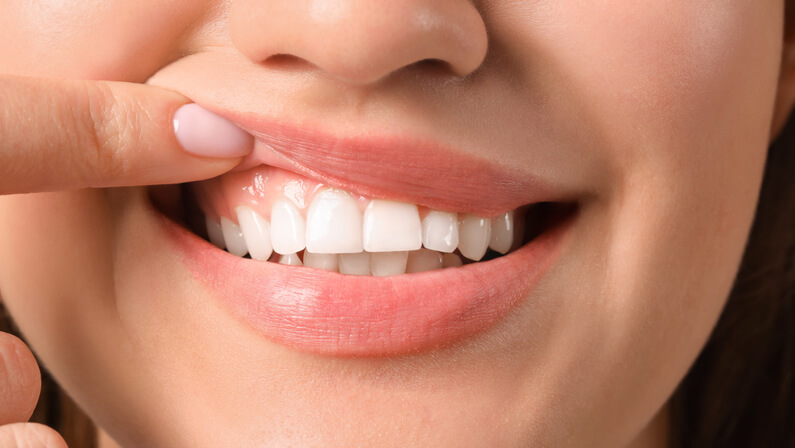Weird things happen when it comes to the gums. Our teeth and jawbones depend on the delicate, pink connective tissue that binds them together. As a result, many individuals are ignorant of its importance.
Gums are generally pink. However, dark brown or black patches might appear on occasion. Several things might cause dark gums. Yet most of them aren’t severe and do not require treatment.
On the other hand, the black patches might sometimes signify a more serious problem. Consult your dentist if you notice any black spots on your gums, or if they change color, shape, or size.
The information below can help you decide whether you need treatment right immediately or can wait until your next dental appointment.
How do you know whether your gums are healthy?
The state of your gums is an excellent indicator of your overall health. Before arranging a dental or medical visit, consider first any differences in color or texture.

Texture and color
A variety of colors can identify healthy gums:
Pink gums are common, while pale gums are also entirely acceptable based on your skin tone. Sun exposure and genetics also play key roles regardless of your skin tone.
In terms of texture, healthy gums have a hard firmness and a good grip on your teeth. You won’t move them around.
Gums that are unhealthy might seem and feel swollen, and they are more flexible than healthy gums. They are frequently sensitive and tender to the touch. They could also start to peel away from your teeth.
Healthy gums also do not bleed when flossing or brushing. When you clean and floss your teeth and notice your gums bleed, it might indicate gum disease.
What causes black gums

The color of one’s gums varies from one person to another. A medical condition, medicine, smoking, or other lifestyle factors can cause black gums and other abnormalities in gum color.
The following are some of the most common reasons for black gums:
Melanin
You probably have black gums because your body generates more melanin.
Oral hygiene issues
Plaque and tartar buildup around the gingival sulcus can easily irritate the gums. If tartar is not removed during a thorough dental cleaning, it causes irritation and redness of the gingival tissue.
Smoking
Gum discoloration may be caused by smoking cigarettes. Known as smoker’s melanosis, this occurs when nicotine in tobacco stimulates the production of more melanin in the skin.
Medication
A variety of drugs can cause black gums, such as the following:
- Minocycline
- Treatments for oral cancer
- Antimalarials
- Antibiotics
- Antipsychotics
Hereditary factors
We have inherited variables as well as species-specific factors among the non-pathological causes. Darker-skinned people, for example, have an overabundance of melanin.
Amalgam Tattoos
Amalgam tattoos can form anywhere in the mouth, although they are most commonly found close to a filling. Inside the mouth, it appears as blue, grey, or dark spots.
Acute necrotizing ulcerative gingivitis (ANUG)
ANUG is a serious gum infection that can cause the gums to turn black. Other symptoms include pain, bleeding, and swelling. ANUG is a medical emergency and requires immediate treatment.
Addison’s Disease
Addison’s disease is a rare condition that occurs when the adrenal glands don’t produce enough hormones. One of the symptoms of Addison’s disease is changes in skin color, which can also affect the gums.
Peutz-Jeghers syndrome
Peutz-Jeghers syndrome is a rare genetic disorder that causes dark spots on the skin and mucous membranes. These spots are caused by an overgrowth of pigment-producing cells.
Pregnancy
During pregnancy, some women may experience changes in gum color due to an increase in hormones. This is usually nothing to worry about and will go away after pregnancy.
Teething period
During the teething period (when babies are growing their first teeth), some may experience changes in gum color. This is normal and will go away once the teeth have come in.
Oral cancer
While it’s rare, black gums can be a sign of oral cancer. Oral cancer usually causes other symptoms like pain, swelling, and difficulty swallowing. If you have any of these symptoms, it’s important to see a doctor right away.
COMMON CAUSES FOR GUM DISCOLORATION
There are many reasons why your gums may be discolored. Some of the most common causes are:
- Poor oral hygiene
- Smoking
- Certain medications
- Bruising
- Amalgam tattoo
- Pregnancy
- Teething period
If you notice that your gums are black, be sure to talk to your doctor.
Treatment
Medicinal herbs can be used to reduce darkening. Herbs including oregano, lemon balm, mint, and sage are commonly used in infusion recipes. Black gums can be treated with these anti-inflammatory substances, although their effectiveness is uncertain.
Sage, chamomile, and calamus root are also recommended by non-traditional medicine. Use these herbs to anesthetize gum disease, decrease inflammation of tissues, and eliminate bad breath with a decoction.
Nevertheless, it’s best to get advice from a healthcare professional first before giving it a try.
Black gums treatment cost
We at Brownstone Dental have different types of treatments available depending on the cause of your black gums. The cost will vary depending on the treatment you need.
If you have any questions or concerns, please don’t hesitate to give us a call. We’re here to help!
How do lighten dark gums at home?
If your gums are discolored, there are a few things you can do at home to help lighten them. These include:
- Brushing your teeth twice a day with toothpaste that contains baking soda.
- Flossing daily.
- Using an electric toothbrush.
- Rinsing with a mouthwash that contains hydrogen peroxide.
You can also try using natural remedies like oil pulling or rubbing your gums with aloe vera gel. If home remedies don’t work, you may need to see a dentist or doctor for treatment.
Preventive measures
In order to maintain good dental hygiene, people should brush their teeth twice a day and floss once a day. You should take these precautions in addition to regular dental examinations.
Teeth and gums should be cleaned with a soft-bristle toothbrush every day, too.

When should you see a doctor?
Darker gums can result from a variety of factors. Many are harmless and respond well to treatment. However, in a few cases, the underlying reason is more serious.
Patients can decide whether they should consult professionals like Brownstone Dental right away after detecting black gums. They can also wait until their next regularly scheduled dental appointment with a better grasp of the situation.
Remember that the quantity of melanin in a person determines the color of body tissues, including gums. If the person has a lot of melanin, his gums may be darker than usual, which is perfectly normal.
However, normal melanin production is unlikely to produce fast changes in gum color or dark patches on gums.